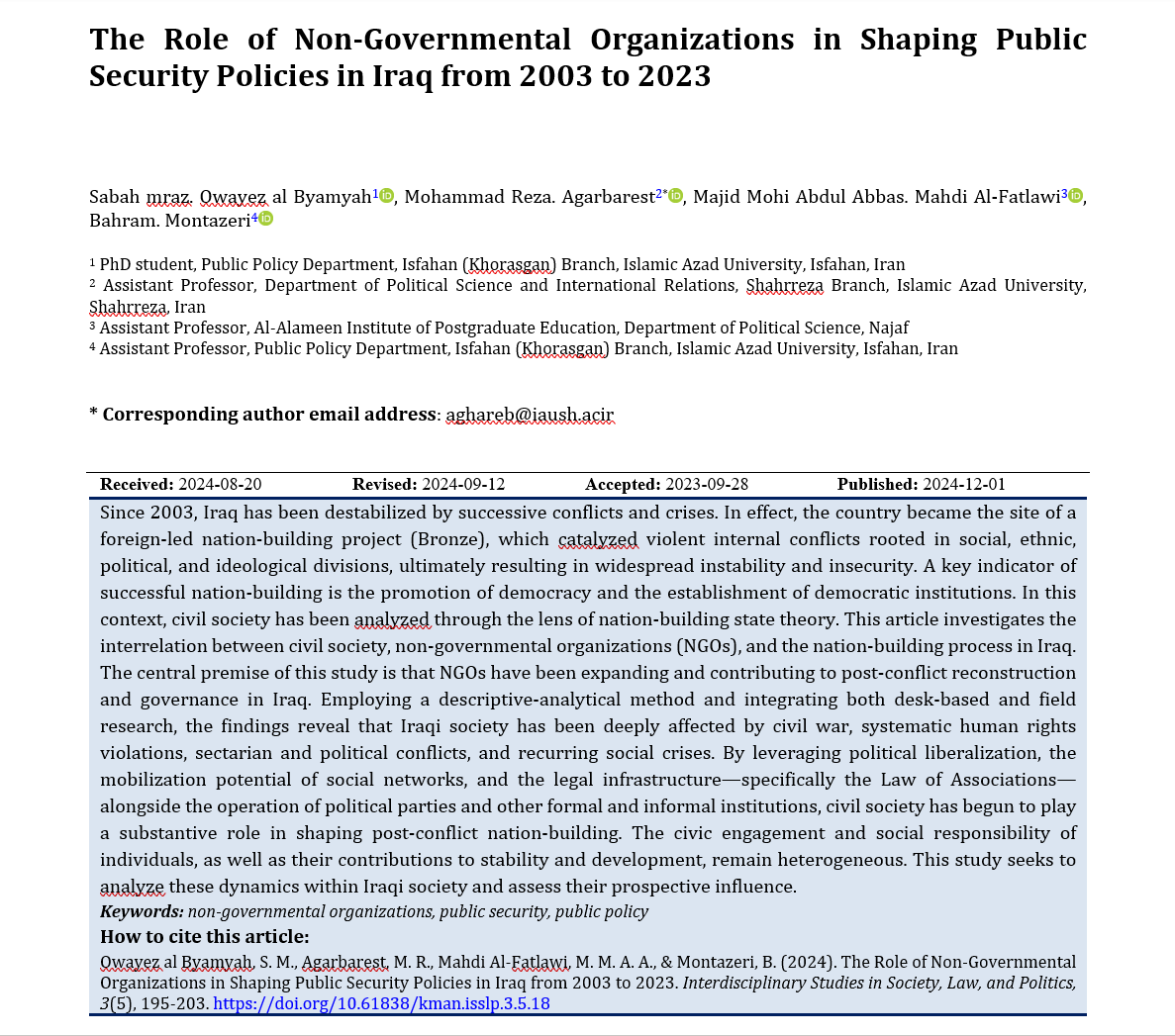The Role of Non-Governmental Organizations in Shaping Public Security Policies in Iraq from 2003 to 2023
Keywords:
non-governmental organizations, public security, public policyAbstract
Since 2003, Iraq has been destabilized by successive conflicts and crises. In effect, the country became the site of a foreign-led nation-building project (Bronze), which catalyzed violent internal conflicts rooted in social, ethnic, political, and ideological divisions, ultimately resulting in widespread instability and insecurity. A key indicator of successful nation-building is the promotion of democracy and the establishment of democratic institutions. In this context, civil society has been analyzed through the lens of nation-building state theory. This article investigates the interrelation between civil society, non-governmental organizations (NGOs), and the nation-building process in Iraq. The central premise of this study is that NGOs have been expanding and contributing to post-conflict reconstruction and governance in Iraq. Employing a descriptive-analytical method and integrating both desk-based and field research, the findings reveal that Iraqi society has been deeply affected by civil war, systematic human rights violations, sectarian and political conflicts, and recurring social crises. By leveraging political liberalization, the mobilization potential of social networks, and the legal infrastructure—specifically the Law of Associations—alongside the operation of political parties and other formal and informal institutions, civil society has begun to play a substantive role in shaping post-conflict nation-building. The civic engagement and social responsibility of individuals, as well as their contributions to stability and development, remain heterogeneous. This study seeks to analyze these dynamics within Iraqi society and assess their prospective influence.
Downloads
References
Abdul-Jabbar Jassim, A. (2015). Terrorism and Christian Places of Worship in Iraq. Dar Al-Islam Cultural Complex.
Abdullah, A. S. (2011). Freedom of Belief, Its Legislative Provisions, Practical Conditions, and Its Importance in Interfaith Dialogue. Al-Halabi Legal Publications.
Al-Akra, A. (1993). Political Terrorism. Al-Tali'aa Printing and Publishing House.
Al-Bakri, Y. (2011). On Civil Society and Democracy in Iraq. Dar Al-Kutub and Al-Watha'iq.
Al-Din, A. S. (2001). Criminalization of Money Laundering in Comparative Legislation. Dar Al-Nahda.
Al-Fahdawi, F. K. (2001). Public Policy: A Holistic Perspective on Structure and Analysis. Dar Al-Masirah.
Al-Kubaisi, A. (1999). Public Policy Making. Dar Al-Masirah for Publishing, Distribution, and Printing.
Al-Naimi, A. N. (2013). The Decision-Making Process in US Foreign Policy as a Model. Dar Zahran.
Al-Rawi, A. O. (2009). Studies in the Iraqi Economy after 2003. Al-Mustansiriya University.
Hussein, S. I. (2012). Civil Society Institutions and Public Policy: Iraq as a Model
Nour El-Din, A. T. (2010). Crisis Management Systems: An Applied Study of Counter-Terrorism Strategies. United Arab Marketing and Supplies Company.

Downloads
Additional Files
Published
Submitted
Revised
Accepted
Issue
Section
License
Copyright (c) 2025 Interdisciplinary Studies in Society, Law, and Politics

This work is licensed under a Creative Commons Attribution-NonCommercial 4.0 International License.





